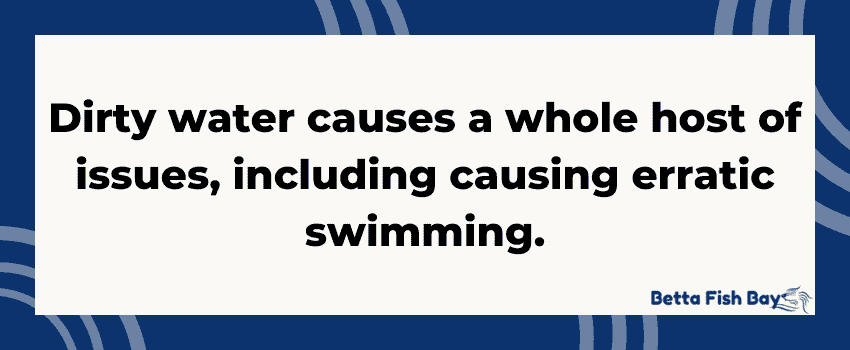Seeing your betta fish swimming in circles or other odd patterns is alarming.
Erratic behavior is not normal for these lively fish, and it is usually a sign of a serious health issue. Poor water conditions also cause frantic swimming in bettas.
So, what should you do if you notice your betta fish swimming erratically?
If your betta is fish swimming erratically, seek out the cause right away! Common diseases like swim bladder disorder and parasites can cause this erratic behavior in your betta. Also, check your water parameters immediately. Without prompt treatment or healthy water conditions, your betta can die.

Table of Contents
Common Causes of Erratic Swimming Behavior in Betta Fish
Understanding the symptoms and causes of erratic swimming behavior is vital to your betta’s health.
Symptoms can progress fast, so prompt treatment is crucial.
Most of these issues have simple solutions. With the right treatment, your betta can make a full recovery.
Swim Bladder Disorder
Most fish species, including bettas, have a swim bladder.
This organ keeps a fish upright and improves buoyancy when swimming.
Swim bladder disorder affects a betta’s buoyancy and swimming capability.
It is not a disease, but it is a secondary symptom of other betta fish diseases. The disorder is more common in bettas and fancy goldfish.
Symptoms
Swimming sideways or upside down are the most notable symptoms of swim bladder disorder in betta fish. Your betta may float to the top of the tank or sink to the bottom.
Other symptoms of swim bladder disorder include:
- Curved spine
- Bloated belly
- Loss of appetite
- Clamped fins
- Lethargy
Other symptoms vary based on the underlying illness.
In swim bladder disorder caused by constipation, your betta may spit out its food. Stringy feces are also a symptom of constipation or parasitic infection.
Causes
Swim bladder disorder is a symptom of several fish diseases. Bacterial infections and intestinal parasites are common causes of this disorder.
Temperature shock and physical injury also cause swim bladder issues.
But the most common causes of swim bladder disorder are overfeeding and constipation.
Overfeeding and constipation usually go hand-in-hand, as one causes the other.
When a betta fish eats pellet foods, they expand in the stomach. This can lead to an intestinal blockage or bloating.
The enlarged stomach puts pressure on the betta’s internal organs and causes swim bladder disorder.
Prevention
Prevent swim bladder disorder by providing your betta with a healthy environment and nutritious diet.
Maintain stable water temperatures and keep the tank clean with weekly partial water changes.
Avoid overfeeding your betta by sticking to a regular feeding schedule.
Offer your betta 2-3 pellets twice daily, around 6-8 hours apart. This keeps your betta full and allows for proper digestion between meals.
A fasting day every week also aids in digestion and prevents constipation.
Provide your betta with a balanced diet by supplementing with live or frozen foods.
Treatment
There are a few methods for treating swim bladder disorder caused by bloating or constipation.
Fasting your betta for 2-3 days is one way of relieving constipation. This allows for the digestion of any food left in your betta’s stomach.
High-fiber foods also help with constipation. Mysis shrimp and daphnia are excellent food sources for fiber.
Another treatment method for swim bladder disorder is an Epsom salt bath.
Do not add Epsom salt to your main betta tank. Epsom salt can harm your live plants and alter your tank’s water chemistry.
Instead, place your betta in a separate quarantine tank with a small amount of dissolved Epsom salt. If your betta relieves itself or seems very stressed, move the fish back to its main tank.
Some betta fish have a defective swim bladder due to birth defects. Birth defects are rare, and there are no treatments for this type of congenital disability.
Water Quality Issues

Maintaining clean aquarium water is important to your betta’s health.
Poor water quality is the main cause of most illnesses in betta fish.
Toxins in your aquarium water also lead to erratic swimming behaviors in bettas.
Stable water parameters are important, as well. Sudden changes in water temperatures or pH levels can alter your betta’s swimming patterns.
Symptoms
Betta fish are usually slow swimmers with gentle movement.
If your betta starts swimming at a frantic pace or gasping for air at the surface, you likely have bad water quality.
Other signs of improper water conditions include:
- Rubbing on objects
- Rapid gill movement
- Inflamed gills
- Lack of appetite
- Lethargy
Causes
Increased ammonia and nitrite levels cause erratic swimming in bettas. Even low levels of ammonia are unsafe and can cause burns on your betta’s body and gills.
Your betta may seek relief by rubbing its body on objects or swimming fast around the tank.
Increased ammonia levels also create a lack of oxygen in the water. This makes your betta swim to the surface more often and gasp for air.
Poor oxygenation also causes neurological damage, leading to a change in swimming habits.
Improper tank temperatures also contribute to erratic swimming behaviors in bettas.
Low temperatures slow a betta’s digestion, leading to lethargy.
Hot temperatures have the opposite effect, causing frantic swimming. This happens because your betta seeks oxygen and more comfortable temperatures.
Prevention
Prevent erratic swimming by maintaining clean water conditions and stable parameters.
Use a water test kit to check for common water quality issues.
Ideal water conditions for betta fish are as follows:
Ideal Water Parameters for a Betta Fish Tank Include the following:
- Temperature: 78-80° degrees Fahrenheit (25.5-27° C)
- pH: 6.5-7.5
- Ammonia and Nitrite: 0 ppm
- Nitrate: < 40 ppm
- gH: 3-4 dGH (50-66.7 ppm)
- kH: 3-5 dKH (53.6-89.4 ppm)
- Minimum Tank Size: 5 Gallons
Weekly partial water changes reduce the amount of toxins like ammonia and nitrites in the water.
The nitrogen cycle also plays a key role in reducing toxins. Beneficial bacteria break down ammonia and nitrites into less harmful nitrates.
Live plants feed on these nitrates and release oxygen into the water.
A quality aquarium filter also maintains oxygen levels by circulating the water.
Ensure your aquarium heater works by checking tank temperatures with a separate thermometer.
Do not overfeed your betta fish. More food means more fish waste and more ammonia.
Leftover food also releases ammonia as it decays.
Treatment
If you suspect poor water quality is the cause of your betta’s erratic swimming, perform a partial water change right away.
A partial water change removes toxic ammonia and nitrogen.
Always treat new water with a water conditioner before adding it to the tank. The water conditioner removes harmful chlorine and chloramine from tap water.
Place your betta in a separate quarantine tank until the main tank has safe water parameters.
Treat ammonia burns on your betta with antibiotic medications.
Your betta should make a full recovery within 5 -7 days.
Stress
Stress can take a toll on your betta’s physical and mental health.
Certain stresses cause erratic swimming habits like darting from one side of the tank to the other.
Prolonged periods of stress may cause health complications in bettas due to a lowered immune system.
Symptoms
A stressed betta swims at a frantic pace around the tank, usually out of irritation.
Your betta may even jump out of the tank to escape the stressor.
Other common signs of stress include:
- Lethargy
- Lack of appetite
- Pale coloring
- Clamped fins
Causes
Bettas in community tanks usually suffer from stress due to overcrowding or aggressive tank mates. The betta may dart away from tank mates or jump out of the tank as a way of escaping danger.
Sudden changes in a betta’s environment also cause stress.
Your betta has a higher chance of becoming stressed when you first bring it home. Not acclimating your betta to its new environment increases the risk of stress and health issues.
A lack of hiding places stresses bettas out because they feel insecure about their surroundings.
If you do not have a lot of plants or other decorations in your betta tank, your fish may see its reflection. Your betta can mistake its reflection for another betta and become aggressive.
Being on high alert all the time increases stress levels in your betta.
Other stressors include loud noises, lots of movement, and bright colors.
Prevention
Reduce stress in your betta by creating a calm environment.
Provide plenty of hiding places and plants, so your betta feels more secure.
Do not place your betta tank in a busy area of your home.
If you have your betta in a community tank, watch for signs of aggression. Never keep fin nippers or male bettas in the same tank as your betta.
Remove aggressive fish from the community tank at the first sign of bullying.
Avoid sudden changes to your betta’s environment. Fluctuating temperatures or pH levels can increase stress and lead to health issues.
Adding a background wallpaper to your betta tank can lower stress levels by decreasing reflections.
Treatment
The best treatment for a stressed betta is making your fish more comfortable.
If you do not have live plants in your betta tank, consider adding some. Having plenty of live plants makes your betta more comfortable by creating a natural environment.
Add more hiding places so your betta can hide until it calms down.
Certain water conditioners, like API Stress Coat, contain aloe vera. This calming agent can reduce stress levels in your betta.
For an all-natural approach, add Indian almond leaves to your betta tank. Indian almond leaves contain tannins, which have healing and stress-relieving qualities.
Tannins also tint the water and recreate a betta’s natural blackwater habitat. Betta fish find this more natural environment soothing.
Diseases

Many common betta fish diseases cause erratic swimming behaviors.
Bettas with common parasites like gill flukes usually rub on objects to relieve the irritation.
Illnesses like ich, velvet, and fin rot also cause erratic swimming due to irritation.
Symptoms
Besides strange swimming habits, these illnesses have other symptoms, such as:
- Lethargy
- Lack of appetite
- Black or white spots on the body
- Increased slime coat
- Ragged fins
Check out our guide on common betta fish diseases to learn more about what these symptoms mean.
Causes
Most diseases and parasites stem from poor water quality.
A dirty tank is a breeding ground for bacteria, parasites, and fungi.
Some diseases enter the tank through contagious tank mates or live foods.
Prevention
Prevent diseases and parasites by maintaining clean water conditions.
Quarantine new tank mates for at least four weeks. This ensures they do not have diseases or parasites they can pass on to your betta.
Some live foods, like blood worms or insect larvae, may contain parasites. Buying your live food from a reputable source lowers the risk of contamination.
Treatment
Treatment for most betta diseases consists of antibiotics like Erythromycin or methylene blue.
Copper sulfate and malachite green are common medications for treating parasitic infections.
Always administer medications to your betta in a separate quarantine tank.
Many medications have long-lasting effects and can harm plants, invertebrates, and scaleless fish.
Other Reasons for Erratic Swimming Behavior in Betta Fish
Tank Size and Setup
A small or overcrowded tank can cause erratic swimming behavior in bettas.
The smallest recommended tank size for a betta fish is 5 gallons. A 10-gallon tank provides even more space for plants and other necessities.
Community tanks with betta fish must be at least 20 gallons.
Providing your betta with enrichment prevents boredom and stress.
Live plants, caves, and toys like these keep your betta happy and healthy.
Take care not to overcrowd the tank with decorations. Your betta needs plenty of space for swimming and can become stressed in a crowded tank.
Improper Diet
A poor diet causes bloating and constipation in bettas. This puts your fish at a greater risk of developing swim bladder disease and erratic swimming habits.
Keep your betta healthy with a balance of protein-rich food and essential nutrients. The ideal diet for a betta contains at least 35 percent in animal protein.
High-quality betta pellets are an excellent staple food. Offer your betta some variety with live or frozen foods like daphnia, baby brine shrimp, and blood worms.
Avoid overfeeding your betta by providing 2-3 pellets twice per day. Space the feeding times at least 6-8 hours apart.
Choose the same day every week for fasting your betta. A day of fasting lets your betta digest any leftover food in its stomach and prevents constipation.
Old Age and Other Impairments
The average lifespan of a betta fish is between 2-5 years.
Older bettas can suffer from impaired eyesight or neurological disorders.
Poor vision and brain disorders can cause erratic swimming in bettas. Your betta may bump into objects in the tank or swim in odd patterns.
Prevent further injuries by adding plants to the sides of the tank as a buffer. Keep other decorations simple, and do not rearrange the tank too often.
Do Healthy Bettas Ever Swim Erratically?

Erratic swimming doesn’t always signal a serious health issue or poor water conditions.
Some bettas are more active than others and like zooming around the tank.
Your betta may get a sudden burst of energy because it’s excited and decide to dart through the water.
This type of behavior is only a cause for concern if it persists daily. Otherwise, you just have a very active betta fish.
Learning To Curb Your Betta’s Erratic Behavior
Most causes of erratic swimming in bettas stem from poor water conditions, stress, and common diseases.
Maintaining safe water parameters and providing a balanced diet keeps your fish healthy.
Watch your betta for persistent erratic swimming behaviors and seek veterinary care if you suspect your fish is sick.
Prompt treatment for your betta is crucial to its full recovery.


